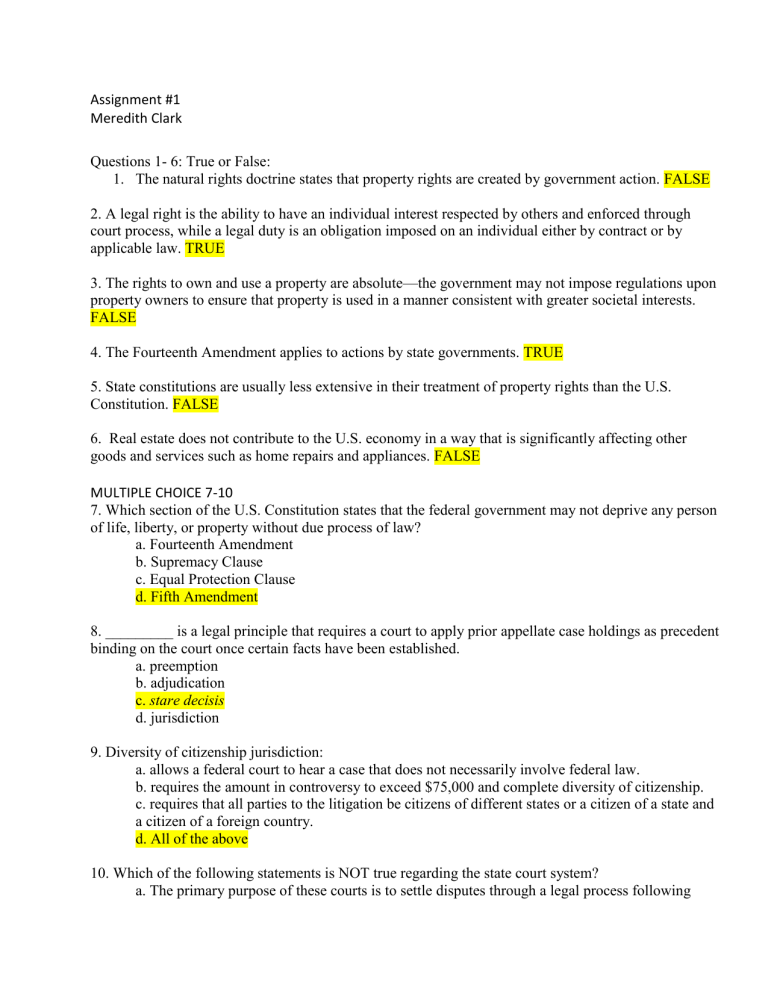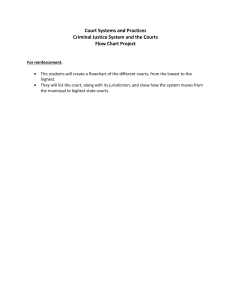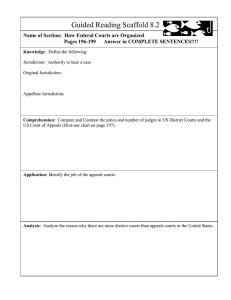
Assignment #1 Meredith Clark Questions 1- 6: True or False: 1. The natural rights doctrine states that property rights are created by government action. FALSE 2. A legal right is the ability to have an individual interest respected by others and enforced through court process, while a legal duty is an obligation imposed on an individual either by contract or by applicable law. TRUE 3. The rights to own and use a property are absolute—the government may not impose regulations upon property owners to ensure that property is used in a manner consistent with greater societal interests. FALSE 4. The Fourteenth Amendment applies to actions by state governments. TRUE 5. State constitutions are usually less extensive in their treatment of property rights than the U.S. Constitution. FALSE 6. Real estate does not contribute to the U.S. economy in a way that is significantly affecting other goods and services such as home repairs and appliances. FALSE MULTIPLE CHOICE 7-10 7. Which section of the U.S. Constitution states that the federal government may not deprive any person of life, liberty, or property without due process of law? a. Fourteenth Amendment b. Supremacy Clause c. Equal Protection Clause d. Fifth Amendment 8. _________ is a legal principle that requires a court to apply prior appellate case holdings as precedent binding on the court once certain facts have been established. a. preemption b. adjudication c. stare decisis d. jurisdiction 9. Diversity of citizenship jurisdiction: a. allows a federal court to hear a case that does not necessarily involve federal law. b. requires the amount in controversy to exceed $75,000 and complete diversity of citizenship. c. requires that all parties to the litigation be citizens of different states or a citizen of a state and a citizen of a foreign country. d. All of the above 10. Which of the following statements is NOT true regarding the state court system? a. The primary purpose of these courts is to settle disputes through a legal process following federal and state laws. b. The trial courts of the state court system are known as superior courts. c. State courts have the power of jurisdiction to decide those cases that Congress authorizes them to decide. d. In some states, the state’s highest court is called the appeals court, and the state’s intermediate appellate court is called the state supreme court. Short answer: 11. Why are real estate disputes not typically resolved in federal courts but rather in state courts? Real estate disputes are typically resolved in state courts rather than federal courts since real estate transactions most often occur between a seller and a buyer, or two citizens of the same state. State courts can look to the Uniform Commercial Code (UCC) as a guideline. The main instance in which real estate disputes are heard in federal court is when they pertain to “breaches of federal mortgage regulations or similar federal legislation” (Introduction to Real Estate Law, chapter 1, page 14). Hypothetical Problem: 12. Choose question #5, 6 or 9 from Chapter Problems, p. 21 State the question you are responding to. Be sure to describe the specific fact(s) in the problem which you rely upon to reach your conclusion. Avoid “I think” statements. #6 From the facts given in the hypothetical problem, we can conclude that the company is filing a lawsuit as they believe that the counterparty is withholding funds and therefore breaching their contract. To remedy this issue, Construction ‘R’ Us can impose a lean by using the commercial property as collateral until the $70,000 debt is paid in full. There is no mention of the two parties being in separate states nor does the amount at hand exceed $75,000. Hence, diversity of citizenship does not exist, meaning this case must be held within the state court system (Introduction to Real Estate Law, chapter 1, page 14). In conclusion, Construction ‘R’ Us cannot file its lawsuit in federal court.


